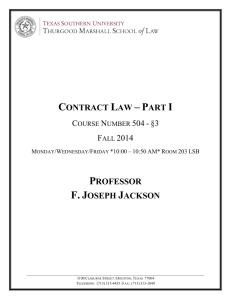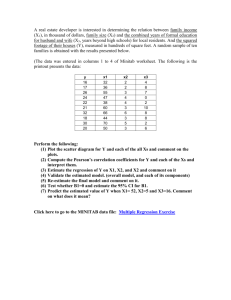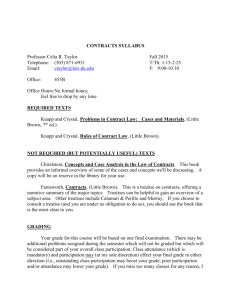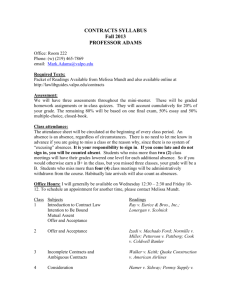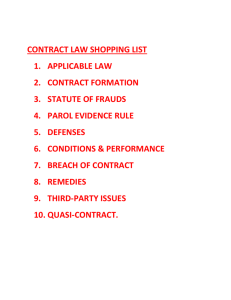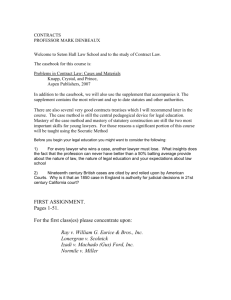1 | Page Monday/Wednesday/Friday * 11:00
advertisement
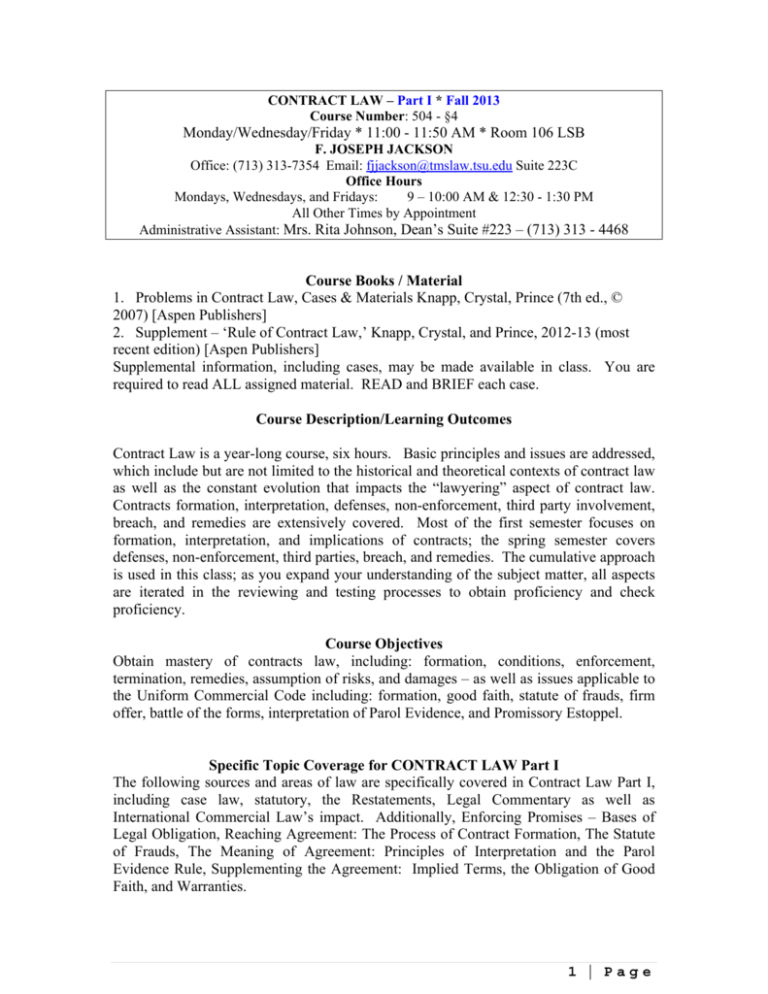
CONTRACT LAW – Part I * Fall 2013 Course Number: 504 - §4 Monday/Wednesday/Friday * 11:00 - 11:50 AM * Room 106 LSB F. JOSEPH JACKSON Office: (713) 313-7354 Email: fjjackson@tmslaw.tsu.edu Suite 223C Office Hours Mondays, Wednesdays, and Fridays: 9 – 10:00 AM & 12:30 - 1:30 PM All Other Times by Appointment Administrative Assistant: Mrs. Rita Johnson, Dean’s Suite #223 – (713) 313 - 4468 Course Books / Material 1. Problems in Contract Law, Cases & Materials Knapp, Crystal, Prince (7th ed., © 2007) [Aspen Publishers] 2. Supplement – ‘Rule of Contract Law,’ Knapp, Crystal, and Prince, 2012-13 (most recent edition) [Aspen Publishers] Supplemental information, including cases, may be made available in class. You are required to read ALL assigned material. READ and BRIEF each case. Course Description/Learning Outcomes Contract Law is a year-long course, six hours. Basic principles and issues are addressed, which include but are not limited to the historical and theoretical contexts of contract law as well as the constant evolution that impacts the “lawyering” aspect of contract law. Contracts formation, interpretation, defenses, non-enforcement, third party involvement, breach, and remedies are extensively covered. Most of the first semester focuses on formation, interpretation, and implications of contracts; the spring semester covers defenses, non-enforcement, third parties, breach, and remedies. The cumulative approach is used in this class; as you expand your understanding of the subject matter, all aspects are iterated in the reviewing and testing processes to obtain proficiency and check proficiency. Course Objectives Obtain mastery of contracts law, including: formation, conditions, enforcement, termination, remedies, assumption of risks, and damages – as well as issues applicable to the Uniform Commercial Code including: formation, good faith, statute of frauds, firm offer, battle of the forms, interpretation of Parol Evidence, and Promissory Estoppel. Specific Topic Coverage for CONTRACT LAW Part I The following sources and areas of law are specifically covered in Contract Law Part I, including case law, statutory, the Restatements, Legal Commentary as well as International Commercial Law’s impact. Additionally, Enforcing Promises – Bases of Legal Obligation, Reaching Agreement: The Process of Contract Formation, The Statute of Frauds, The Meaning of Agreement: Principles of Interpretation and the Parol Evidence Rule, Supplementing the Agreement: Implied Terms, the Obligation of Good Faith, and Warranties. 1 | Page Participation & Attendance You are required to attend class, read all assignments, and participate in discussions. At the beginning of each class a “recap” (of the last class) is conducted – be prepared to participate. Your grade may be reduced by ½ letter grade if you exceed the allotted absences. See Student Rules and Regulations for further details about grade reductions due to absenteeism. Attendance is taken at the beginning of class. If you enter class after the roll has been called, you must tell me, at the end of class, before I leave the room that you arrived late. This is your responsibility; failure to alert me will result in an absence, which may affect your final grade. NO EXCEPTIONS! Do not attempt to address the absence issue in the hallway or in my office – this policy is strictly enforced; in other words, do not attempt to make an excuse. The rule will not be waived. THE SYLLABUS IS SUBJECT TO ADJUSTMENTS TO ENSURE COVERAGE. Grading Fall 2013: Midterm _____________ Class Fall Final Exam _____________ (See Final Exam Schedule for Date/Time/Room) Spring 2014: Quiz I Quiz II Quiz III Final Uniform Exam _____________ _____________ _____________ _____________ 10 % 10% - Dec. 2013 10% 10% 10% 50% May 2014 - Policies & Procedures Any special accommodations must be requested via the Office of Student Affairs. You are expected to abide by the Honor Code. (See Student Rules and Regulations for Further Details) You are expected to conduct yourself in a professional manner – civility toward classmates is mandatory; this is graduate school. The usage of cell phones or any other technical communication devices is NOT allowed in class; NO cell phones are allowed on your desks during examinations. Computer use is restricted to note-taking and class related purposes only. Professor Jackson reserves the right to limit computer use during class; if this occurs, you are then required to take notes the old fashioned way – pen to paper. Students are required and expected to prepare for all classes; preparation and commitment are critical to mastering the material. You must use an EXAM NUMBER when submitting assignments to be graded, unless otherwise noted. EXAM NUMBERS can be obtained in the Office of Student Affairs via Mrs. Rita Johnson, Dean’s Suite #223. 2 | Page Notes Holiday: Midterm Exam: Last Class Day: Reading Period: Thanksgiving Holiday: Final Exam: Labor Day – Monday, September 2, 2013 (No Class) Week of October 7 – 11, 2013 / WEEK 8 Monday, November 25, 2013 November 26 – November 27, 2013 November 28 – 29, 2013 TBA – See Final Exam Schedule (Dec. 2 – Dec. 13, 2013) READING ASSIGNMENTS – CONSTRACT LAW Part I FALL 2013 Note: You are to read the applicable UCC and Restatement Sections for each chapter. (See Supplement-ROCL) READ ALL PROBLEMS WEEK 1 Class Orientation: Introductions, Expectations and Rules of Engagement, Course Overview Chapter 1 – Introduction to Contract Law 1-29 Chapter 1 – Introduction to Contract Law Allen v. Bissinger & Co. Feldman v. Google, Inc. WEEK 2 Chapter 2 – The Basis of Contractual Obligation: Mutual Assent and Consideration Chapter 2 - Objective Theory of Contract Ray v. William G. Eurice & Bros., Inc. 31-207 Chapter 2 – Offer and Acceptance in Bilateral Contracts Lonergan v. Scolnick Izadi v. Machado (Gus) Ford, Inc. Chapter 2 – Offer and Acceptance in Bilateral / Unilateral Contracts Normile v. Miller Petterson v. Pattberg 3 | Page WEEK 3 Chapter 2 – Offer and Acceptance in Unilateral Contracts Cook v. Coldwell Banker/Frank Laiben Realty Co. Comment: Remedies for Breach of Contract Chapter 2 – Postponed Bargaining: The “Agreement to Agree” Walker v. Keith Quake Construction, Inc. v. American Airlines, Inc. Comment: The Pennzoil/Texaco Case Chapter 2 – Consideration Defining Consideration Hamer v. Sidway Comment: History of Consideration Pennsy Supply, Inc. v. American Ash Recycling Corp. of Pennsylvania WEEK 4/5 Chapter 2 – Consideration Applying the Consideration Doctrine Dougherty v. Salt Comment: The Lawyer’s Role in Counseling for Legal Effect Batsakis v. Demotsis Comment: Option Contracts, Consideration, and Limiting the Power to Revoke an Offer Plowman v. Indian Refining Co. Comment: The Power of Agents to Bind Their Principals Marshall Durbin Food Corp. v Baker Chapter 2 – Contract Formation Under Article 2 of the Uniform Commercial Code Jannusch v. Naffziger E.C. Styberg Engineering Co. v. Eaton Corp. Introduction to the CISG Irrevocability by Statute: The “Firm Offer” Chapter 2 – Qualified Acceptance: The “Battle of the Forms” Princess Cruises, Inc., v. General Electric Co. Brown Machine, Inc. v. Hercules, Inc. Paul Gottlieb & Co., Inc. v. Alps South Corp. WEEK 5/6 Chapter 2 – Electronic and “Layered” Contracting Hines v. Overstock.com, Inc. DeFontes v. Dell, Inc. Chapter 3 – Liability in the Absence of Bargained-for-Exchange: Promissory Estoppel & Restitution The Doctrine of Promissory Estoppel Kirksey v. Kirksey Harvey v. Dow 209-323 4 | Page WEEK 6/7 Chapter 3 – Charitable Subscriptions King v. Trustees of Boston University Chapter 3 – Promises in a Commercial Contract Katz v. Danny Dare, Inc. Aceves v. U. S. Bank, N.A. Comment: The Status and Future of Promissory Estoppel Chapter 3 – Limiting the Offeror’s Power to Revoke: The Effect of Pre-Acceptance Reliance James Baird Co. v. Gimbel Bros., Inc. Drennan v. Star Paving Co. Comment: Contract Law and Business Practice Berryman v. Kmoch Pop’s Cones, Inc. v. Resorts International Hotel, Inc. WEEK 8 Chapter 3 – Liability for Benefit Received: Restitution Restitution in the Absence of a Promise Credit-Bureau Enterprises, Inc., v. Pelo Commerce Partnership 8098 Ltd. Partnership v. Equity Contracting Co., Inc. Watts v. Watts MIDTERM EXAM Chapter 3 – Promissory Restitution Mills v. Wyman Webb v. McGowin WEEK 9/10/11 Chapter 4 – Statute of Frauds Scope and Application Crabtree v. Elizabeth Arden Sales Corp. Beaver v. Brumlow 325-371 Winternitz v. Summit Hills Joint Venture Comment: The Historical Development of Law and Equity Alaska Democratic Party v. Rice Chapter 4 – Sale of Goods Statute of Frauds: UCC §2-201 Buffaloe v. Hart Comment: The Merchant Confirmation Exception WEEK 12/13 Chapter 5 – The Meaning of the Agreement: Principles of Interpretation and the Parol Evidence Rule Principles of Interpretation Joyner v. Adams Frigaliment Importing Co. v. B.N.S. International Sales Corp. C & J Fertilizer, Inc. v. Allied Mutual Insurance Co. 373-45 5 | Page Chapter 5 – The Parol Evidence Rule Thompson v. Libby Taylor v. State Farm Mutual Automobile Insurance Co. Sherrodd, Inc. v. Morrison-Knudson Co. Nanakuli Paving & Rock Co. v. Shell Oil Co. WEEK 14/15 Chapter 6 – Supplementing the Agreement: Implied Contract Terms, the Obligation of Good Faith, and Warranties 457-532 The Rationale for Implied Terms Wood v. Lucy, Lady Duff-Gordon Leibel v. Raynor Manufacturing Co. Chapter 6 – Implied Obligation of Good Faith Seidenberg v. Summit Bank Comment: Requirements and Output Contracts Morin Building Products v. Baystone Construction, Inc. Locke v. Warner Bros., Inc Donahue v. Federal Express Corp. Chapter 6 – Warranties / Implied Warranties Bayliner Marine Corp. v. Crow Caceci v. Di Canio Construction Corp. 6 | Page
